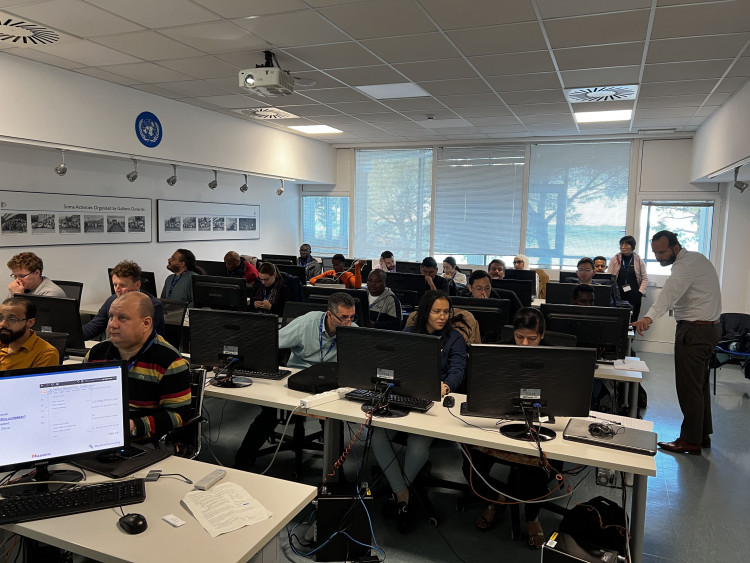From processing vast amounts of data to providing insights beyond human capabilities, artificial intelligence (AI) has the potential to power unprecedented progress in the medical uses of radiation to improve diagnosis and treatment. As the deployment and use of AI-based tools grow over the next decade, clinically qualified medical physicists (CQMPs) will play an essential role in facilitating the safe, effective and appropriate application of such tools.
To help CQMPs around the world meet the challenges of the present and the demands of the future, the IAEA published a new guidance document in 2023 on the International Day of Medical Physics (7 November): Artificial Intelligence in Medical Physics: Roles, Responsibilities, Education and Training of Clinically Qualified Medical Physicists. Endorsed by the American Association of Physicists in Medicine (AAPM), it frames the roles and responsibilities of CQMPs in the field of implementation and utilization of AI in the medical uses of radiation; provides guidance on the competencies they need; outlines an elective module for postgraduate academic programmes; and suggests continuing professional development activities. It also provides examples of medical imaging and radiation oncology processes to which AI-based tools can be applied - be it to prioritize cases by improving workflows, optimize image procedures by estimating radiation doses or personalize care by enhancing treatment decisions, to name but a few.
Within multidisciplinary healthcare teams, CQMPs bridge complex technological tools with clinical needs as the scientists who use physical principles, methods and techniques within the clinical environment. As AI-based tools are becoming more common, CQMPs will be responsible for their validation, acceptance, safe use and quality assurance. To that end, they should develop the technical specifications for procuring, integrating and possibly connecting these tools into existing information technology infrastructure. In collaborating closely with clinicians on quality and safety matters, they will oversee their proper functioning and provide advice on any performance deviations. As part of the team that will design and implement quality management programmes, CQMPs will lead risk assessments, prepare workflow protocols guiding the clinical use of AI-based tools and contribute to ensuring continued quality and safety.
"There is a pressing need for a new curriculum to update the knowledge and training of clinically qualified medical physicists," said Mauro Carrara, Head of the IAEA Dosimetry and Medical Radiation Physics Section and one of the IAEA officers responsible for the publication. "The IAEA's new resource serves as a starting point," he added, noting that the publication had already been viewed more than 6600 times in the three weeks following its release.
Enhancing Skills and Knowledge
To help develop the knowledge and skills of CQMPs to use AI-based tools, the IAEA and the Abdus Salam International Centre for Theoretical Physics (ICTP) organized a joint workshop on Artificial Intelligence for Medical Physicists in Trieste, Italy, from 20 to 24 November 2023. The workshop - which was co-sponsored by the International Organization for Medical Physics and AAPM and endorsed by the European Federation of Organisations for Medical Physics - equipped 59 early and mid-career medical physicists from 50 countries with an overview of the field and the theoretical principles underpinning neural networks, machine learning, deep learning and data management. Participants also examined the various technical, ethical and legal challenges that CQMPs have to consider.
"This comprehensive workshop essentially provided medical physicists with the relevant theoretical foundations and considerations needed to ensure quality patient care and safety," explained Jackie Wu, Professor of Radiation Oncology at Duke University in the United States and one of the workshop's expert lecturers. "Such training is critical for them to be well prepared for the integration and safe use of AI within clinical workflows and practices."
In hands-on training sessions, participants applied their theoretical understanding as they actively explored specific AI technologies. Collectively, these exercises enabled participants to cultivate the skills needed to assess and use AI in radiation medicine.
"The knowledge I acquired will help me deploy AI-based tools, validate them locally and utilize them properly," said Darko Stojanovic, a medical physicist from Serbia. "I am keen to share what I have learned with my colleagues to help them understand how AI-based tools work and prepare them for their proper deployment, validation, use and quality control. This is the most important task for both clinical and scientific implementation."

Workshop participants actively applying their new AI knowledge and skills in hands-on, group-based laboratory exercises. (Photo: E. Titovich/IAEA)






